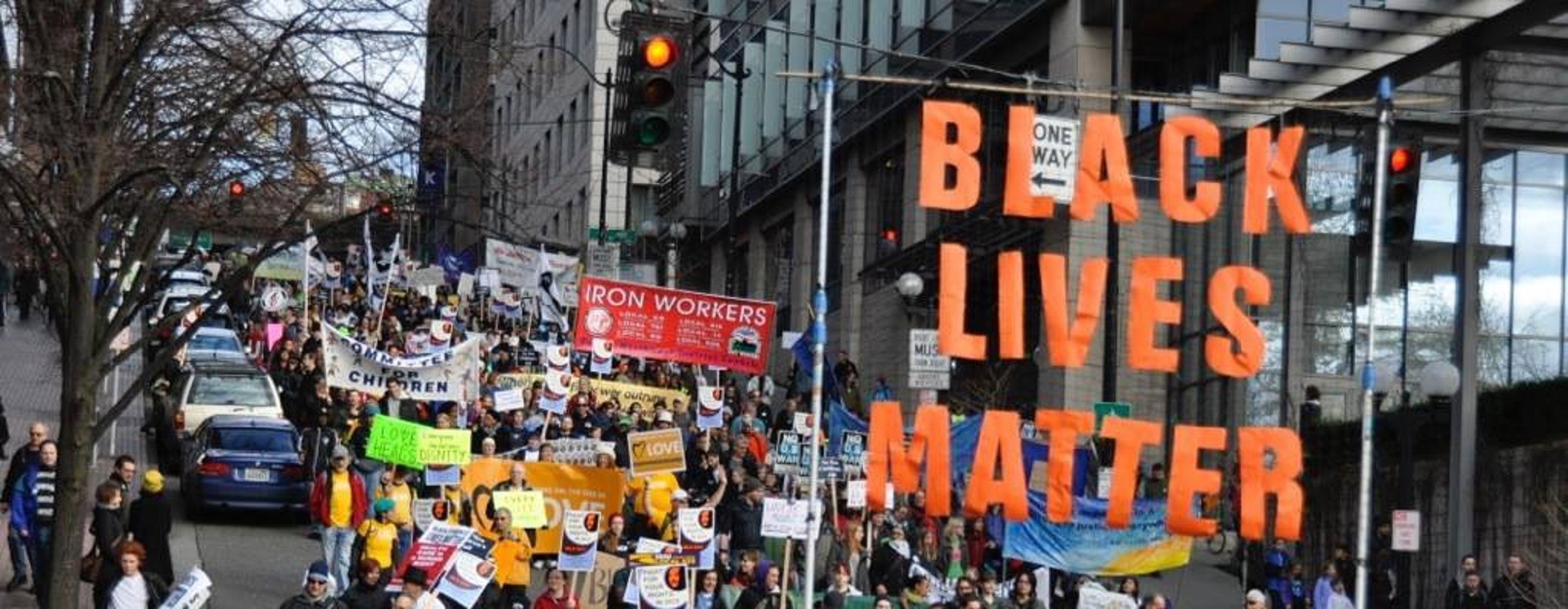How an act of senseless forgiveness during the Amber Guyger trial moved a nation.

Black Lives Matter protest march. 2015. (photo: Backbone Campaign)
A Masterclass in Forgiveness
A masterclass on forgiveness was taught in a Dallas courtroom last week.
The faithful aren’t flocking to see a weeping Virgin Mary statue, they aren’t likely to make a pilgrimage to an ordinary Dallas courtroom, but God might have made a brief appearance there nonetheless.
The story of Amber Guyger, the Texas police officer who shot and killed her upstairs neighbor after she claims to have mistaken his apartment for her own and him for an intruder, was bound to have garnered national attention.
At least in 2019, post-Black Lives Matter, though not necessarily before.
A white cop shoots an unarmed Black man in his own home. During the course of Guyger’s trial, we learned that her victim, Botham Jean, was eating a bowl of ice cream on his couch when Guyger entered his apartment with her service weapon drawn and shot him twice.
It was a terrible crime, made more terrible by the sheer stupidity of it, it’s mendacity. That something so small as a failing to lock an apartment door could mean a death sentence at the hands of someone trained and tasked with keeping the peace.
That is, if you are Black in America.
This story, very possibly through the work of Black Lives Matter activists, had a different ending from the one many people following the trial might have expected.
Amber Guyger, though she appeared genuinely remorseful for the crime, which she maintained throughout the trial was an accident, was found guilty.
Her sentence of 10-years, critics of the U.S. criminal justice system argue, is still much lighter than someone of color might have received in a similar circumstance. They aren’t wrong. Racial disparity in sentencing exists. It is a problem the Trump administration has been surprisingly eager to take on, passing the first meaningful criminal justice reform, the FIRST STEP Act, in decades.
It was at Amber Guyger’s sentencing hearing that something truly remarkable took place.
Botham Jean’s younger brother took the stand during the portion of the sentencing in which family members of the victims are allowed to read impact statements. The convicted person must sit in the courtroom and listen to the ways in which their crime has impacted a victim’s family.
His voice halting, obviously working hard to control his grief, Brandt Jean 18, addressed the woman who shot and killed his big brother.
“If you truly are sorry,” he told her, “I forgive you.”
Crediting his faith in God, and his belief in his Christian faith, Brandt Jean gave a masterclass in the raw, transformative power of forgiveness. Brandt Jean encouraged Guyger to to find solace in God, in faith; in his love and forgiveness, and in God’s.
Guyger can be heard in the background sobbing as Jean finished his declaration of love for his brother’s killer by asking the judge:
“I don’t know if this is possible, but can I give her a hug, please? Please?”
Watching a convicted murderer sob in the arms of the brother of her victim after such a selfless act moved even the judge in the case. The judge gave Guyger a hug and her own Bible.
The moving scene, and the sentiment of forgiveness, wasn’t well received by everyone. White people, some argued, cannot be so easily forgiven for the crimes historically perpetrated on African-Americans, on immigrants.
But Amber Guyger isn’t responsible for all that, only the crime she committed. She isn’t personally responsible for 400-years of systemic and systematic racism. She can’t be punished for it: She can only be burned in effigy.
“But she’s part of the system,” some may argue.
You can’t punish systems: They’re systems.
You can change systems, rectify the codified injustices, like racial disparities in sentencing. You can only punish people.
No, that isn’t quite right. You can punish persons.
Botham Jean’s brother specifically said he couldn’t forgive this white cop who killed his black brother for everyone, only himself.
The most extreme members of Black Lives Matter could have carte blanche in the Amber Guyger case, and her sentence.
They could pass a death sentence by electrocution in an electric chair human beings have built specifically for this purpose, which in my opinion is the cruelest form of capital punishment in America.
You could even remove all the restrictions on cruel and unusual punishment, carry out a sentence of the most gruesome torture imaginable and it still wouldn’t do anything; because you would never be able to punish one person enough to make up for slavery, segregation, Jim Crow, the school to prison pipeline, generational poverty and discrimination.
Never.
Punishing a scapegoat does not punish the system.
Burn Amber in effigy on Monday, young African-American men would continue to be incarcerated at a higher rate, and executed at a higher rate, on Tuesday. And again on Wednesday, and every day, long after Amber ashes were burned to dust and blown away in the wind.
You can punish persons and you can change systems; but you can’t punish systems.
To change people, a single courageous act of senseless forgiveness, of unimaginable grace, is an excellent place to start.
(contributing writer, Brooke Bell)